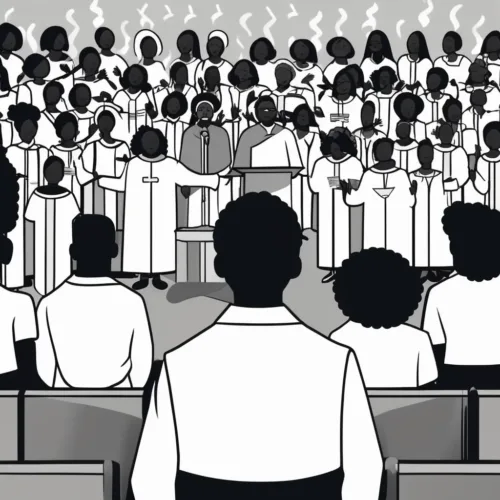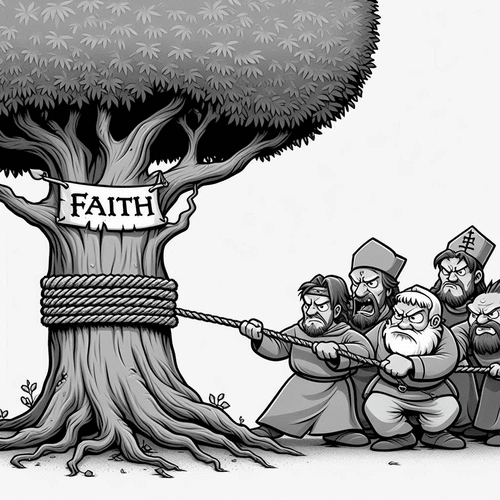Oneness Theology Vs Biblical Truth: Doctrines in Conflict
Oneness Theology Vs Biblical Truth: When it comes to understanding Bible doctrine, no error could be more consequential than misidentifying God’s very nature. Yet this is precisely what Oneness Pentecostalism does. By rejecting the Trinity and claiming the Father, Son, and Holy Spirit are merely different manifestations of a single divine person, Oneness theology doesn’t just mishandle a few Bible verses—it undermines the very foundation of Christian faith, salvation, and worship. The error, though perhaps well-intentioned in its desire to protect divine unity, creates a cascade of biblical contradictions that ultimately distort our understanding of Christ’s person, work, and the entire drama of redemption. As we shall discover, what may seem like abstract theological hair-splitting actually strikes at the heart of how we relate to God, experience salvation, and live the Christian life.
OVERVIEW OF ONENESS PENTECOSTALISM
Historical Background: Oneness Theology, also known as Modalism or Sabellianism, emerged in the early centuries of Christianity. Key figures such as Sabellius propagated this belief—that God manifests Himself in three modes—Father, Son, and Holy Spirit, rather than being three distinct persons.
Core Beliefs: Central to Oneness Theology is the rejection of the Trinity. Proponents argue the Father, Son, and Holy Spirit are not distinct persons but different expressions of a single divine being.
THEOLOGICAL ISSUES IN ONENESS PENTECOSTALISM
Scriptural Interpretation Problems
Oneness theology’s approach to Scripture reveals several fundamental interpretative flaws. While claiming to take the Bible literally, it often mishandles key texts in problematic ways:
- John’s Prologue: Oneness theologians struggle with John 1:1-18, particularly the distinction between “the Word” and “God.” Their interpretation that “the Word” is simply God’s plan or thought rather than the personal Logos (second person of the Trinity) fails to account for the passage’s clear personal language. When John writes “the Word was with God,” he uses the Greek preposition “pros,” indicating face-to-face relationship – impossible if the Word is merely an impersonal divine plan.
- Jesus’ Prayers: Perhaps most problematically, Oneness theology must explain away Jesus’ prayers as either theatrical performances or expressions of His human nature talking to His divine nature. This creates an artificial division within Christ’s person and fails to account for texts like Hebrews 5:7 that describe Jesus’ prayers as genuine expressions of relationship with the Father.
- The Holy Spirit: Oneness interpretations struggle to explain passages where all three persons of the Trinity appear distinctly, such as: at Jesus’ baptism (Matthew 3:16-17), in the promise of the Comforter (John 14-16), the baptismal formula (Matthew 28:19), and in Paul’s trinitarian benediction (2 Corinthians 13:14).
Misunderstanding of the Trinity
Oneness theology often mischaracterises the orthodox doctrine of the Trinity, attacking a straw man version that no informed Trinitarian actually believes:
False Assumptions: They incorrectly assume biblical monotheism requires unipersonality. They mistakenly equate persons with beings—especially in accusing Trinitarianism of teaching there are three Gods. They wrongly assume distinction necessitates separation.
Orthodox Trinitarian Teaching: The classical doctrine of the Trinity affirms:
- One divine essence (what God is)
- Three distinct persons (who God is)
- Equal deity of Father, Son, and Spirit
- Eternal relations of origin
- Inseparable operations of the Trinity
Orthodox Trinitarianism maintains both the absolute unity of God (Deuteronomy 6:4) and the real distinction of persons (Matthew 28:19). This balance preserves both biblical monotheism and the full revelation of Father, Son, and Spirit.
Christological Errors
Oneness theology’s departure from orthodox Trinitarianism creates serious problems in its understanding of Christ:
- The Incarnation: Oneness teaching effectively collapses the entire Godhead into the incarnation, leading to several problems: It cannot explain who was ruling the universe while Jesus slept in the manger. It confuses the distinct operations of the divine persons in the incarnation. And it struggles to explain how Jesus could be truly human while being the entire Godhead incarnate
- Christ’s Mediation: The biblical teaching that Christ is the one mediator between God and man (1 Timothy 2:5) becomes incoherent in Oneness theology: If Jesus is simply God in human form, who is He mediating with? How can He represent both God and man if He is simply God manifesting Himself? What happens to Christ’s ongoing high priestly ministry?
- The Two Natures Oneness theology often resorts to dividing Christ’s human and divine natures so sharply they become almost separate persons: Jesus’ human nature prays to His divine nature. The human nature suffers while the divine nature remains impassible—that is, incapable of suffering or feeling pain. The human nature learns while the divine nature knows all.
- Implications for Salvation: These Christological errors have serious implications for soteriology: If Christ is not truly the eternal Son, how can He offer eternal salvation? If the Son is merely a temporary manifestation, what happens to our eternal security? And, if Jesus is simply God in human form rather than the God-man mediator, how can He truly represent both parties in reconciliation?
REFORMED RESPONSE TO COMMON ONENESS ARGUMENTS
Oneness adherents often cite passages emphasising God’s oneness, such as Deuteronomy 6:4 (“Hear, O Israel: The LORD our God, the LORD is one”). However, Reformed theology has long recognised that the Bible’s emphasis on divine unity is perfectly compatible with Trinity. The Hebrew word for “one” (echad) often denotes a composite unity, as in Genesis 2:24 where man and woman become “one flesh.”
When Jesus says, “I and the Father are one” (John 10:30), the context and grammar indicate a unity of purpose and nature, not personal identity. The surrounding verses show Jesus distinguishing Himself from the Father while claiming divine prerogatives—which is precisely what we would expect in Trinitarian theology.
THE REFORMED DEFENCE OF ORTHODOX TRINITARIANISM
Reformed theology has consistently maintained the doctrine of the Trinity is not a philosophical speculation but a biblical necessity. The Westminster Confession articulates this carefully: “In the unity of the Godhead there be three persons, of one substance, power, and eternity: God the Father, God the Son, and God the Holy Ghost.”
This doctrine is essential in understanding:
- God’s eternal nature as love (requiring multiple persons)
- The possibility of genuine divine-human relationship
- The integrity of Christ’s saving work
- The reality of divine indwelling
ONENESS THEOLOGY VS BIBLICAL TRUTH: CONCLUSION
The implications of adopting Oneness theology extend far beyond academic debate—they touch every aspect of Christian faith and practice. When we lose the biblical truth of the Trinity, we don’t simply lose a doctrine; we lose the God of Scripture Himself. We lose the Father who planned our redemption, the Son who accomplished it through genuine incarnation and mediation, and the Spirit who applies it to our hearts. We lose the eternal love within the Godhead that forms the basis for our understanding of love and relationship. We lose the true Jesus Christ, who as the eternal Son became flesh to represent us before the Father.
Orthodox Trinitarianism isn’t merely the correct answer in a theological exam—it’s the essential framework for understanding God’s nature, Christ’s work, and our salvation. In defending the Trinity, we’re not just protecting an ancient dogma; we’re preserving the biblical gospel itself and the true knowledge of the God who saves.
Oneness Theology Vs Biblical Truth—Related FAQs
What has Oneness Pentecostalism lost in terms of understanding God’s eternal nature? Oneness theology has lost the profound truth that God is eternally relational within Himself, existing in perfect love and communion before creation. By reducing the Father, Son, and Spirit to mere roles rather than eternal persons, it presents a God who only became relational when He created, fundamentally altering the biblical portrait of God’s self-sufficient and unchanging nature. This loss impacts our understanding of God’s love, as it can no longer be seen as flowing from His eternal nature but becomes dependent on creation.
- How does Oneness theology compromise our understanding of Christ’s mediation? Oneness theology effectively eliminates the possibility of true mediation between God and humanity, since you can’t mediate between yourself. The biblical truth that Christ stands between God and man as both fully divine and fully human becomes logically impossible if Jesus is simply God playing different roles. This compromises the heart of the gospel, where Christ’s unique position as God-man mediator is essential for our salvation.
- What aspects of prayer and worship are lost in Oneness theology? The rich biblical pattern of approaching the Father through the Son by the Spirit becomes meaningless in Oneness theology, reducing prayer to a confusing monologue with God in different modes. The intimacy of Jesus’ own prayer life with the Father, which serves as our model for prayer, becomes merely theatrical rather than expressing genuine divine relationships. This fundamentally alters how believers understand and practice their communion with God.
How does Oneness theology affect our understanding of adoption and sonship? The biblical teaching that believers become adopted children of the Father through union with the eternal Son loses its meaning in Oneness theology. If there is no eternal Father-Son relationship within God, our adoption becomes merely metaphorical rather than a genuine sharing in Christ’s sonship. This diminishes the profound reality of what it means to be brought into God’s family through Christ.
- What is lost in terms of understanding Christ’s current ministry? Oneness theology cannot adequately explain Christ’s present ministry of intercession at the Father’s right hand, as described in Hebrews 7:25. The biblical picture of Jesus as our eternal High Priest, continually representing us before the Father, becomes incoherent if Jesus and the Father are the same person. This loss affects how we understand our ongoing relationship with Christ and His continuous work on our behalf.
- How does Oneness theology compromise our understanding of salvation history? The beautiful coordination between Father, Son, and Spirit in planning, accomplishing, and applying salvation is lost in Oneness theology. Instead of seeing the distinct but unified operations of the divine persons in redemption, we’re left with one person playing different roles at different times, which fails to capture the biblical narrative of salvation. This undermines our understanding of how God works in history and in our personal salvation.
What aspects of assurance of salvation are compromised in Oneness theology? The believer’s assurance of salvation is weakened when the eternal relationship between the Father and Son is denied. If Jesus is merely a temporary role that God played, rather than the eternal Son, questions arise about the permanence of our salvation and our eternal relationship with God. Moreover, the Spirit’s witness to our adoption loses its grounding when the Trinity is rejected.
Oneness Theology Vs Biblical Truth—Our Related Posts
Editor's Pick

GPS Without Eyes: How Ants Silently Shout Intelligent Design
Picture a leafcutter ant navigating the rainforest floor in pitch darkness, carrying a leaf fragment 50 times its body weight. [...]

Born Broken: Why Must We Affirm Original Sin?
Imagine a world where we’re born neutral—free to choose good, and without a bias toward evil. Sounds appealing… until we [...]

Does God Truly Care About My Everyday Choices?
OWe believe God created the universe. We believe He orchestrated the exodus from Egypt and raised Jesus from the dead. [...]
SUPPORT US:
Feel the Holy Spirit's gentle nudge to partner with us?
Donate Online:
Account Name: TRUTHS TO DIE FOR FOUNDATION
Account Number: 10243565459
Bank IFSC: IDFB0043391
Bank Name: IDFC FIRST BANK






